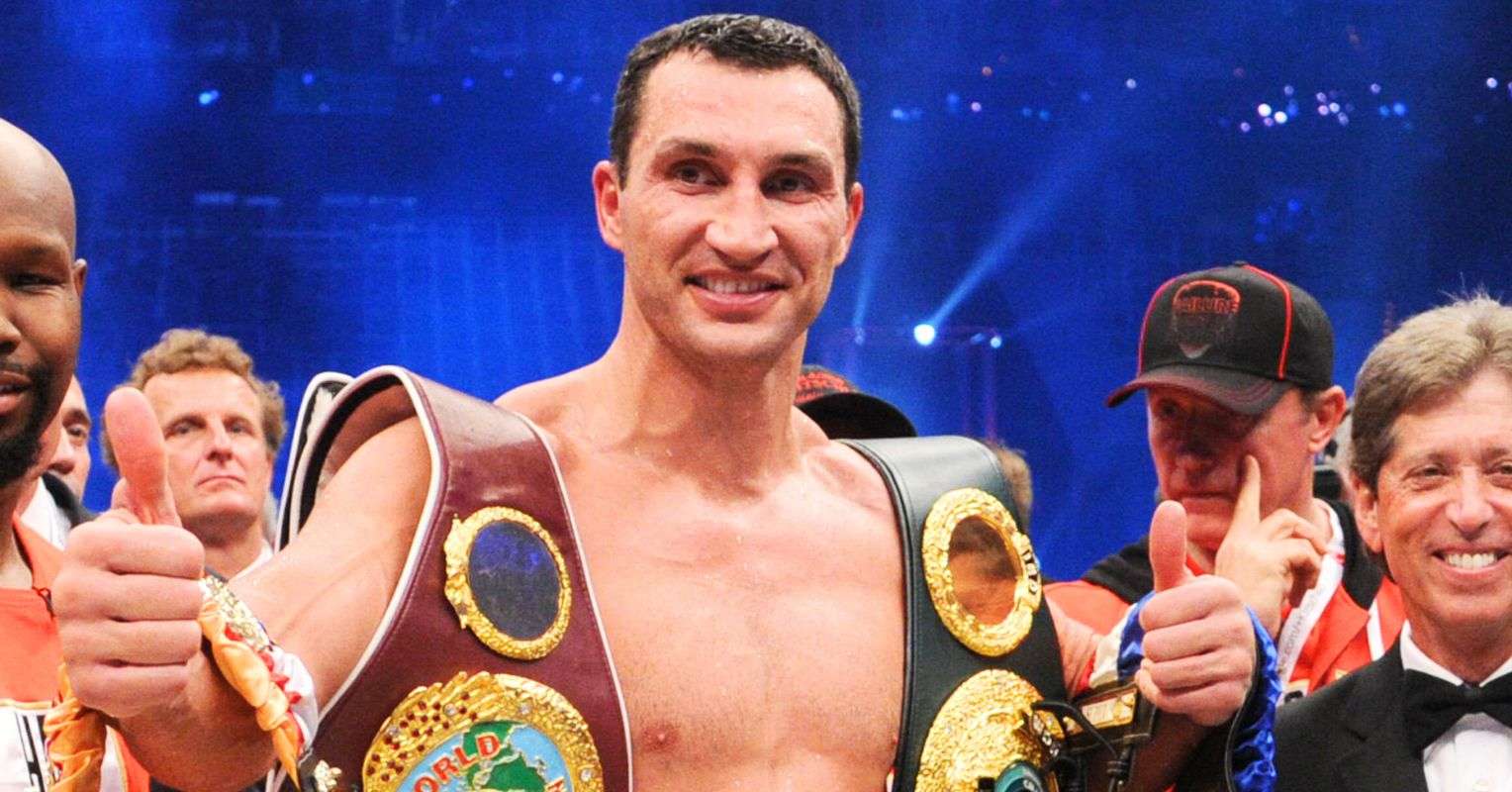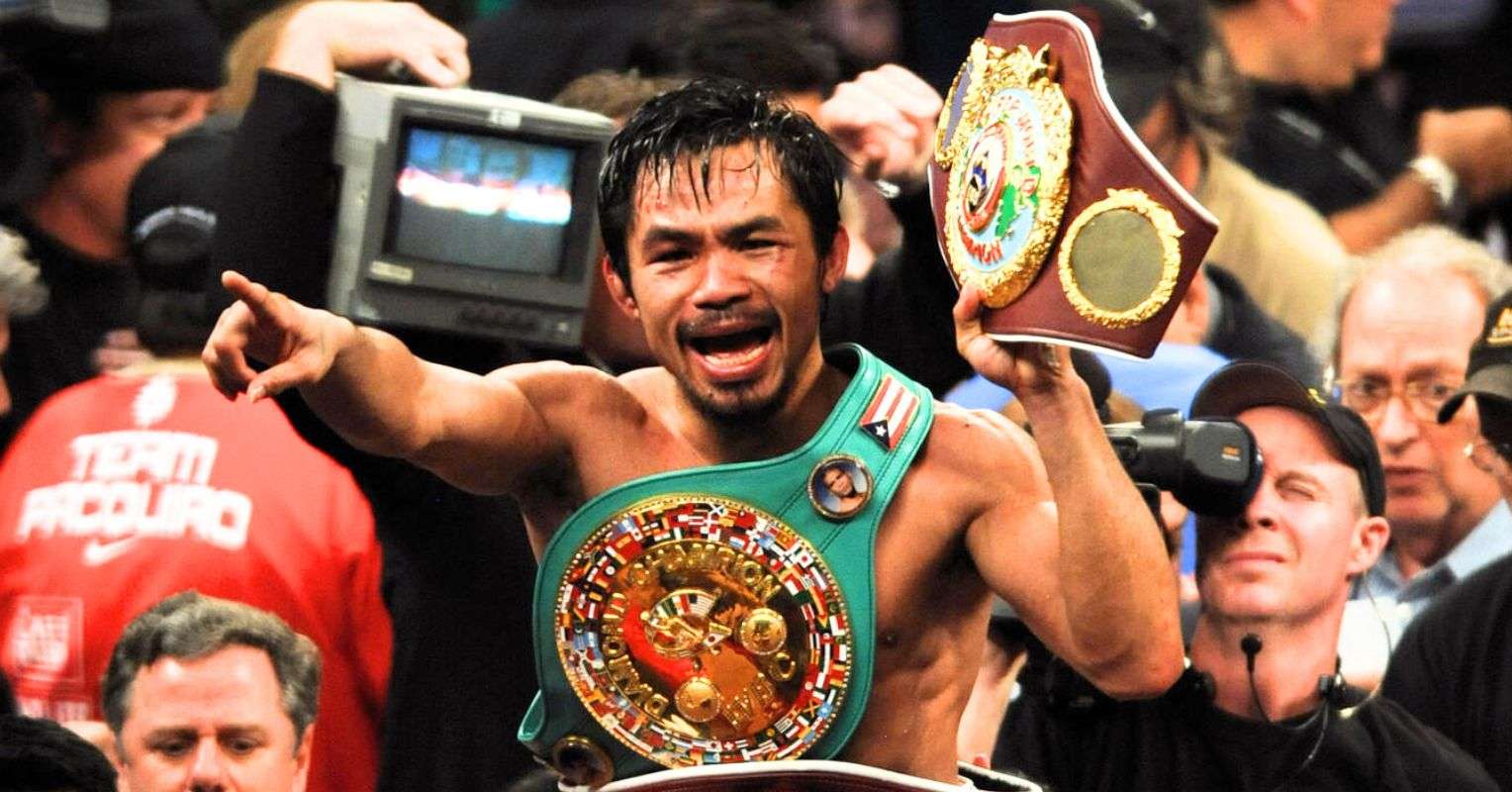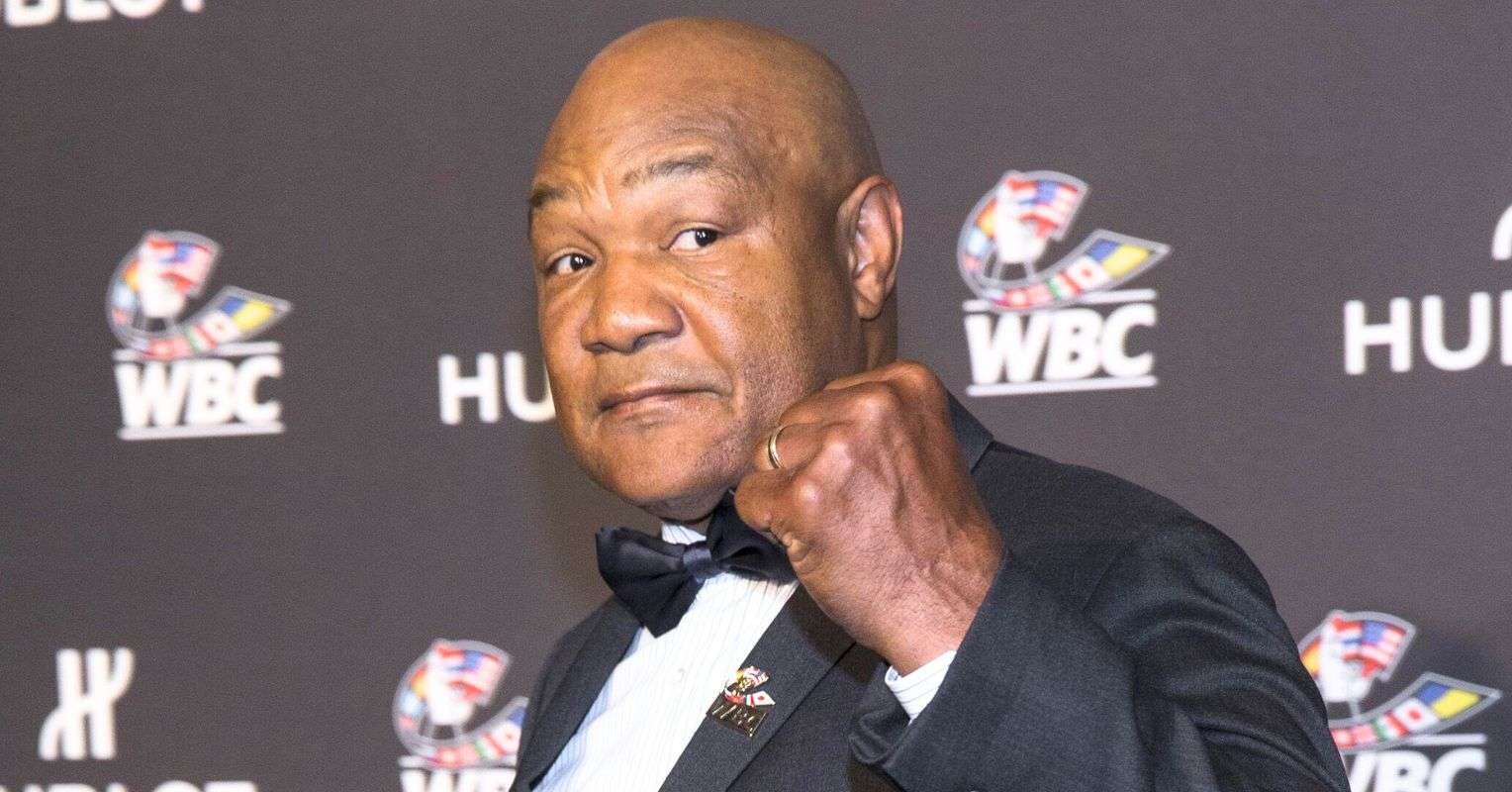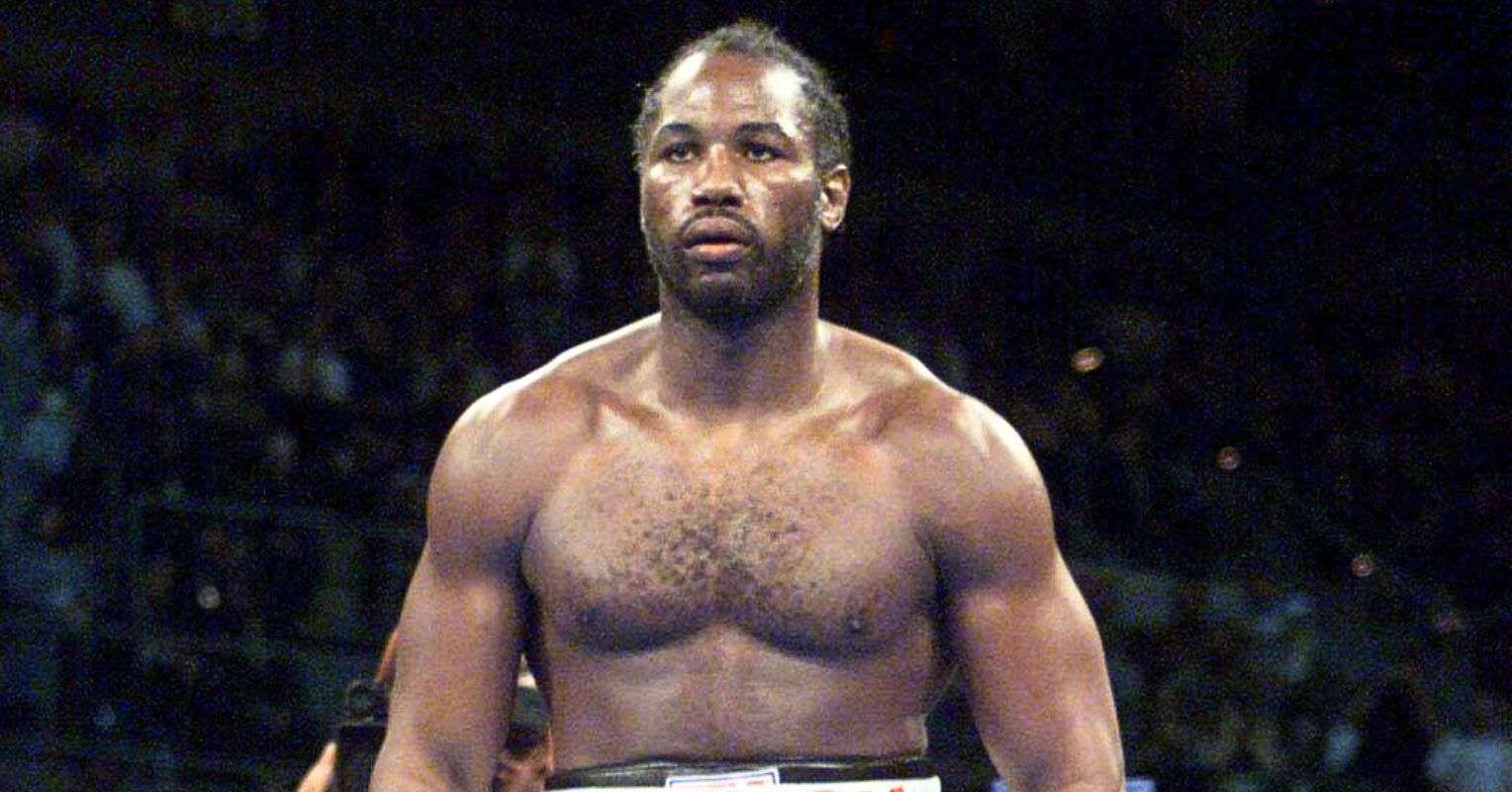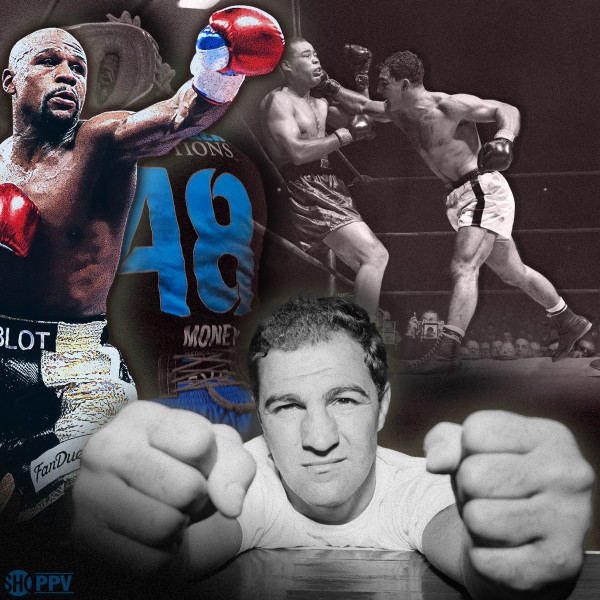
Photo courtesy of Showtime Sports
The last time the boxing world had a discussion comparing the significance of Rocky Marciano’s 49-0 record to a contemporary fighter was in 1985, when an approaching Larry Holmes failed to reach the mark in a loss to Michael Spinks, resulting in a profanity laden post-fight press conference tirade forever linked to the quote; “Rocky Marciano couldn’t carry my jock strap.”
A little over 30 years later, the discussion has resurfaced as Floyd Mayweather’s one-sided drubbing of former titlist Andre Berto in what would be his final fight, tied Marciano’s perfect record. By reaching 49-0, Mayweather is one of the few mainstream fighters who can invoke that conversation, as there are other champions who have retired undefeated and even surpassed this record over that 30-year span.
Every time these comparisons come up, the usual criteria presents itself: quality of opponents, titles, defenses, etc. But it’s the intangibles that Marciano represents to boxing that are undefeated in these comparisons. Truthfully, Marciano is never considered as the best heavyweight of all time.
Marciano embodied Americana in the 1950’s, the heavily romanticized morals and values of that era, personified in a fighter. When Donald Trump and his supporters talk about making America great again, it’s Marciano’s era they’re referring to.
Marciano is the archetype for the American version of boxing’s paragon. He was a white, working class fighter, on the smaller side for heavyweights. His success, in spite of his flaws, is what captivated many Americans, making him the most popular champion since Joe Louis (before Muhammad Ali’s era, of course) and more relatable among the majority of boxing fans.
Marciano’s punching power was so revered that during his rise in boxing, the U.S. Testing Co. did a sports science-like experiment to measure it. They claimed the impact from Marciano’s punch was harder than an armor-piercing bullet. As ridiculous as that little anecdote on his power is, it just demonstrates how the media invested into building his folklore and legend. So much so, that years after he retired they used a computer simulation (involving the real fighters) to predict a hypothetical outcome of a fight between Ali and Marciano, with Marciano winning.
The perennial underdog, Marciano won most of his fights–even those he was dramatically losing–by knockout. There is nothing more captivating in all of sports than seeing a fighter come back from the brink of defeat to win a fight by knockout. In the 50’s Marciano emerged from the sea of black champions like a brand new life raft, shiny and white; being the only White American Heavyweight champion in 14 years since Joe Louis took the title from “The Cinderella Man,” James Braddock. I seriously doubt that hurt his popularity.
Despite his status, Marciano had and still has detractors. While his resume is not touted for its depth, Marciano existed during a time where the fighter didn’t have much of a say in who they faced. This specific detail always gives Marciano the ultimate advantage or excuse, depending on your perspective (more on this later). It’s hard to find many boxing fans who will agree that anyone did 49-0 better than “The Rock.” He was an all-action heavyweight fighter with a moral high ground and virtuous pedestal.
What Floyd Mayweather represented in boxing is entirely opposite of Marciano; arrogance, flamboyance and audacity. To many, Mayweather embodied a sort of counter culture as void of respect and humility for the sport, but rife with materialism. Mayweather has been boxing’s heel, playing the villain by actively challenging the conceptions of what boxing’s pinnacle athlete and champion should be. He’s also made more money in his career than any other prizefighter in boxing history, generating an estimated $1.3 Billion dollars in pay-per-view revenue which is quite odd, when you consider “boring” is usually how most of his fights were described, especially in the later years of his career.
Mayweather was widely considered boring from the lack of action in his fights. Known for his ring IQ, defensive prowess and technical mastery of the old “hit without getting hit” adage; Mayweather rarely put himself in risky situations in the ring. Boxing fans want knockouts. Winning 47 percent of his career fights by decision, Mayweather retired having gone four years without stopping an opponent. Mayweather provided spectacle and theatrics around his fights.
The polarity Mayweather influenced among boxing fans was a spectacle to observe. However, his brash persona outside the ring has garnered heavy bias against the self-proclaimed “Best Ever.” Regardless, fans still shelled out their hard earned money to see if Mayweather would finally be humbled.
Mayweather played to many of the same tropes that made Marciano a legend. Good versus Evil. Humility versus Hubris. The difference: Mayweather made a decision to be the heel. He knew early on that he wasn’t the type of guy fans usually back, because he wasn’t as flawed as a fighter, or hit as hard as other prizefighters who seem to value or represent what Marciano did. The decision to wear the proverbial “black hat” by peddling hatred and/or resentment to boxing fans, seemed to be a brilliant business strategy, considering the money he generated doing it.
Mayweather reigned during the social media age, wherein professional athletes experience a level of exposure unlike any era before it. As a result, Mayweather’s issues with domestic violence have been well documented and in today’s more progressive society the coverage has solidified his role as villain.
Through a subjective or moral lens, Mayweather never wins this comparison with Marciano. On paper though, Floyd Mayweather has Rocky Marciano defeated by a long shot.
Comparing them statistically will require adjustments based on the differences in era. In this case during the 1950’s, champions were typically recognized by the NBA (now the WBA) and sometimes through major news print publications (coining the term, paper champ). In order to level the playing field we’ll only recognize Mayweather’s lineal titles, since they’re equivalent to the NBA heavyweight title that Marciano held.
Floyd Mayweather:
Record: 49-0, 26 KOs
Won lineal championships in four weight classes (Super Featherweight, Lightweight, Welterweight 2x and Jr. Middleweight)
23-0, 9 KOs in lineal title fights
12-0, 3 KOs against former or current lineal titlists
2-0, 1 KO against Hall of Famers (recognized by the International Boxing Hall of Fame or IBHOF)
Ring Magazine Fighter of the year 2x (98’, 07’)
Highest differential in punching percentage in Compubox history
Rocky Marciano:
49-0 (43 KOs)
Won the World Heavyweight title
7-0, 6 KOs in lineal title fights
7-0, 6 KOs against former lineal titlist
4-0, 4 KOs against Hall of Famers (recognized by IBHOF)
Ring Magazine Fighter of the year 3x (52’, 54’, 55’)
Ring Magazine Fight of the year 3x (52’, 53’ 54’)
Highest Knockout percentage of any Heavyweight champion in boxing history
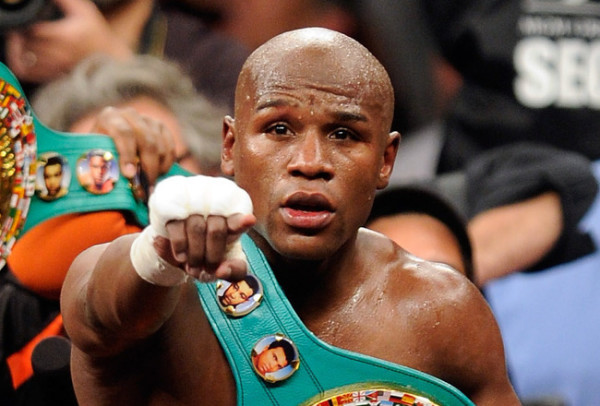
Photo by Ethan Miller/Getty Images
When you compare these numbers, Marciano has a claim to being the more exciting of the two, garnering three “Fight of the Year” bouts and also due to his legendary knockout percentage. He also faced more Hall of Famer fighters than Mayweather–as of now. When Juan Manuel Marquez, Shane Mosley, Manny Pacquiao, Miguel Cotto and (possibly) Canelo Alvarez retire, then Marciano will no longer hold that edge over Mayweather.
Technically, Mayweather has accomplished more in the sport and has fought at the world-class level longer in an almost 20-year career, than Marciano did in his brief eight-year career as a heavyweight prizefighter.
Mayweather has won more titles, has won three times as many title fights, and fought five more world titlists than Marciano. Mayweather has been fighting at the highest level for over 17 years, despite the load of criticism that plagued his career. All but five of his last 32 fights have been for some version of a world title in that time.
No matter how anyone feels about him personally, Mayweather should be a first ballot Hall of Fame inductee in everyone’s mind.
There are a few things Mayweather and Marciano share besides that 49-0 record of perfection, one being they both have faced their fair share of criticism. There is a lot to be made of how their resumes have been dissected by the boxing world.
Marciano is often criticized for fighting older fighters in the sunset of their careers, like Hall of Famer’s Joe Louis (37), Jersey Joe Walcott (38 and 39) and Archie Moore (38). He’s also been knocked for facing less-than-stellar opponents throughout his career–outside of those Hall of Famer’s including Ezzard Charles, two of which he faced twice–even after he’d won the title.
Mayweather faced the most criticism for his shrewd negotiating practices with his rival, Manny Pacquiao, resulting in a five-year delay before finally facing and defeating Pacquiao in May of 2015. Mayweather has also been accused of avoiding numerous fighters throughout his career, many of which he eventually fought and defeated. It was often against the fans wishes of immediacy, though, with Mayweather fighting these opponents on his terms.
Another similarity lies in Mayweather and Marciano’s respective matches against Jose Luis Castillo and Roland La Starza. Many people felt Mayweather got an undeserved decision over Castillo, whom Mayweather defeated by a landslide decision in the rematch. Coincidentally, Marciano was accused of getting the same type of treatment over Roland La Starza, but Marciano ultimately defeated La Starza by knockout in a rematch for Marciano’s title.
Marciano’s saving grace against the criticisms of his resume has been that he fought during a time when fighters’ choice for opponents really didn’t matter. However, that doesn’t mean that Rocky always fought the toughest opponent out there.
Don Cockell ring a bell?
There’s an argument that Marciano’s career was carefully handled by the International Boxing Club of New York, or IBC, at the time. The IBC was the biggest promotional banner in pro boxing during the ’50s, that was taken down by the federal government.
The IBC was indicted, convicted, and disbanded for violating anti-trust laws in order to monopolize boxing by controlling “championship” boxing, making exclusive deals with major venues like Madison Square Garden, Detroit’s Olympia (renamed Joe Louis Arena in the late 70’s), and the Chicago stadium (sounds similar to the allegations levied against Al Haymon and his Premier Boxing Champions banner’s exclusive television and venue deals, minus controlling championship fights, which explains all the lawsuits he’s facing recently).
The IBC would use its stronghold on boxing–through venue and also television deals–to entice the top contenders in to a situation where they were forced to agree that if they win a title, they had to fight for the IBC only.
James Shipley wrote about the IBC influence in a 1956 Sports Illustrated article. “If the IBC controls the fighter’s goal–the championship–its influence on him as to where and when and whom he fights is enormous,” wrote Shipley.
Shipley also stated, “But the IBC certainly controlled Rocky’s services during the lush years.”
In order to get a shot at any title –all of which except the bantam and flyweight straps, were controlled by the IBC – you had to comply with the IBC’s will.
So the argument could be made that just because Rocky Marciano didn’t get to choose his opponents doesn’t mean that he didn’t benefit from the IBC’s potential control over his opponents.
In fact, the decision against La Starza in their first fight was documented as grossly negligent judging by most accounts. How can we be certain the IBC didn’t manipulate that situation to their and ultimately Marciano’s favor?
At the end of the day, both of these guys were amazing talents and did legendary things in the ring that cannot be replicated. They both deserve all the credit and the criticism, too.
Comparisons are usually subjective and in making them, some times we reveal more about ourselves than the athletes. However that’s what makes boxing relatable, while driving some of the best conversations between fans.
